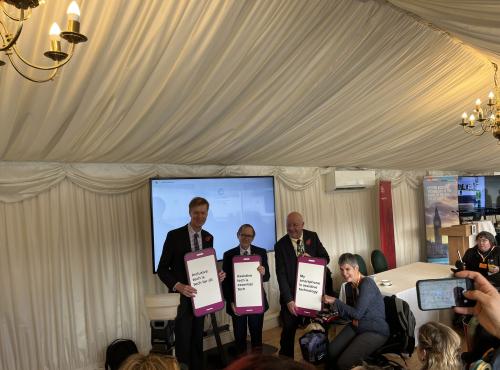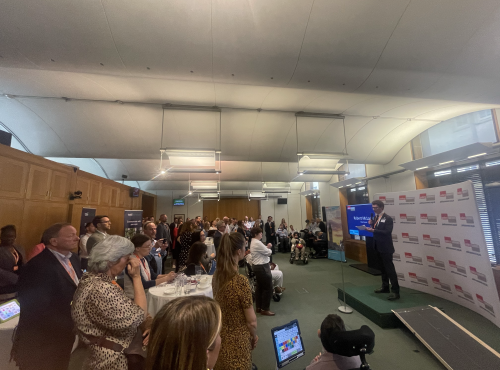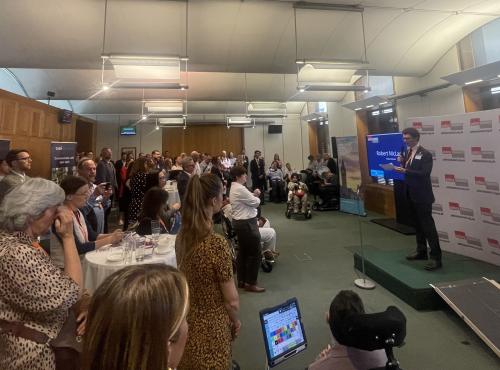Minister calls for mainstreaming of ATech in delivering public and private services
On 8 February, Minister for Disabled People Chloe Smith MP joined APPGAT co-Chair Paul Maynard at Policy Connect's event on ATech and the National Disability Strategy. The Minister's full speech can be read below.
I'm really pleased to join you to talk about assistive and accessible technology, which as many of you do, I'm going to take the liberty of shortening to ATech so we don't get tongue twisted all the way through a few minutes of speech. And as we all know, ATech covers a broad range of adaptations and products and appliances which of course includes a spectrum of complexity from low-tech solutions like walking sticks, modified can-openers or medication dispensers all the way through of course to high-tech electronic interventions, which could include voice-activated systems that help control areas of our home, could include hearing implants, could include GPS megaphone apps that help families or carers locate a person who is lost. All those technological solutions can make life changing impact on a disabled person's life, and I am really energised and excited about the chance to be ingenious and inventive like you and to do much more in this space.
So, harnessing the potential of that technology, high or low technology, can remove barriers and increase opportunities for disabled people, which is why I'm so excited about them because I want to see the benefits of accessibility brought to all. Many disabled people tell me that they are using ATech to realise their aspirations, from education to employment to recreation and social life, which is great. But I also hear from disabled people who tell me that they face huge inconsistencies between products and services that are available to them. Too often I think we would all agree you can see technology being developed without taking into account the needs and preferences of disabled users. Too often I think disabled people might like access to the technology that would benefit them or maybe could be in a position where they have to use technology that in itself constitutes a barrier. And as I think we can sometimes see disabled people and those around them not having necessarily the awareness training or support that would be needed to ensure that ATech could be used effectively.
The government is providing significant support for innovation and development of ATech and also to improve access to its use. These exciting opportunities include the potential contributions of technologies such as artificial intelligence and robotics from the leading – bleeding edge technologies working on specific areas. In healthcare, further research is planned into the potential technologies that could support health outcomes for disabled people through the National Institute of Health Research, health technology assessment program. In the financial year 19 to 20, so last year, UK Research and Innovation, which is UKRI, invested £54.8 million in research and development related to ATech, which was good to see, and to date UKRI's industrial challenge fund has invested £1.4 million in ATech projects.
But there is much more that we can all do, which is why I really welcome the launch today of the new ATech Policy Lab, supported of course by Policy Connect and with partners Bournemouth University and Ace Centre who I believe are here today. I think it is really a credit to Policy Connect to be able to evolve in this way with their think tank role, and I know that you've been working really closely with the Cabinet Office Disability Unit on stakeholder workshops and research. I hope that is a way in which we can continue to be partners to deliver on our ambitions for assistive and accessible tech.
I think we would all agree that it is critical to continue to work together in partnership on research and design, evidence-based policy solutions in this area. That will allow us to share knowledge and innovation that will also have the benefit of promoting the United Kingdom as a world leader in this field, as well as, of course, directly benefiting disabled people, which is our goal. We do need to think, of course, about how we reach the large numbers of people who require this tech. That is, as I say, our core goal. We want to bring together policy initiatives, bring together pockets of good practice in the public and private sectors, developed so far. And to help reach those large numbers of people who want to benefit from them. And help them be sustained over the long-term. It is for those reasons, that ATech is highlighted in the government's National Disability Strategy published last July, six months ago.
Tech touches many aspects of all of our lives, no single government department could own this agenda, that is reflected by the nine ATech commitments in the NDS are spread across a range of departments, DWP, The Cabinet Office, the Home Office, BEIS, and DCMS. These commitments focus on a range of issues which are important to disabled people, which include accessible housing, excess ability of private sector websites, innovation challenges, improving the skills gap in ATech across government, and creating a Centre for ATech. The last two commitments that I mentioned are specifically seeking to improve the government's capability in this field, because we are keen for ATech to be mainstreamed as part of the everyday delivering of public and private services for disabled people and also nondisabled people, if I may put that point in as well. We know that many of the innovations we might be talking about could be broadly useful, and I think that is just as important as we think about what is right for the mainstream to understand how our entire society can be inclusive and accessible, so that disability issues are not in some way out of the mainstream, but are in the mainstream.
Let me tell you a little more about two particular commitments where we are seeing good progress that I wanted to share with you. First of all, the Department for Levelling Up, Housing and Communities, is making good progress on their commitment to commission new research to develop statutory guidance on meeting building regulations. This covers access to and use of buildings, in doing so they are engaging with assistive technology experts to cover access to and use of buildings. Last June they commissioned research on prevalence and demographics of impairment in England and ergonomic requirements and experiences of disabled people. Research is due to be completed this year. I am looking forward to seeing that.
The second point I wanted to make was around Access to Work, which falls directly in my own portfolio at the Department for Work and Pensions. As many of you will already know, it is a fantastic scheme offering financial support to those people that need extra help to get to and thrive at work. Through Access to Work, disabled people can benefit from grants worth up to £62,900, to contribute to in work support. This will include specialist equipment and sometimes technology needed to support people to do their job. We know that we need to do more to raise the visibility of this support and in particular, transitions into employment. That is why we have included two commitments in this area in the National Disability Strategy. The adjustment passport pilots are helping us gain an understanding of the more coherent journey of adjustment support which could reduce the need for assessments, empower the passport holder to have a more confident conversation with potential employers. We are making good progress with our commitment there, to make that passport available to disabled students when they leave university. It is being piloted in four universities already. My Call to Action for you today, if I may, is to ask your help to continue to spread the word about Access to Work, because it is very practical application often of ATech, and I can see somebody in the chat confirming that they use Access to Work, I hope it is working well for you. And as I say, your assistance in spreading that word will help it work for even more people and that is one of the goals that I have in that area. Anything you can do more broadly within the ATech field to help do that, I think, would bring obvious benefits to disabled people.
In closing, thank you very much for all of the work that you have done and will continue to do in driving forward innovation and excellence in the ATech field. I know that you are going to have a really good conversation onwards today, I will be able to listen to a little bit of it and then my officials from the Disability Unit will stay with you for the whole of the rest of the event, to bring away points where I may be able to help you support and improve ATech, where you may have any further questions for me at the Department and the wider government, on our commitments to ATech from the perspective of the public sector. Or indeed, anything to do with my wider disability portfolio, where my priorities broadly include the reforms that we brought forward in our Green Paper, where we will be returning with more details in the summer of this year. Of course, the National Disability Strategy which I have mentioned, and thirdly, disability employment which is a real personal passion for me. Thank you very much once again for inviting me to join you today. Thank you for your time and listening. I hope that the transcription has been able to pick up much of what I have said, I am happy to return with further details later if not. Back to you, chair.



